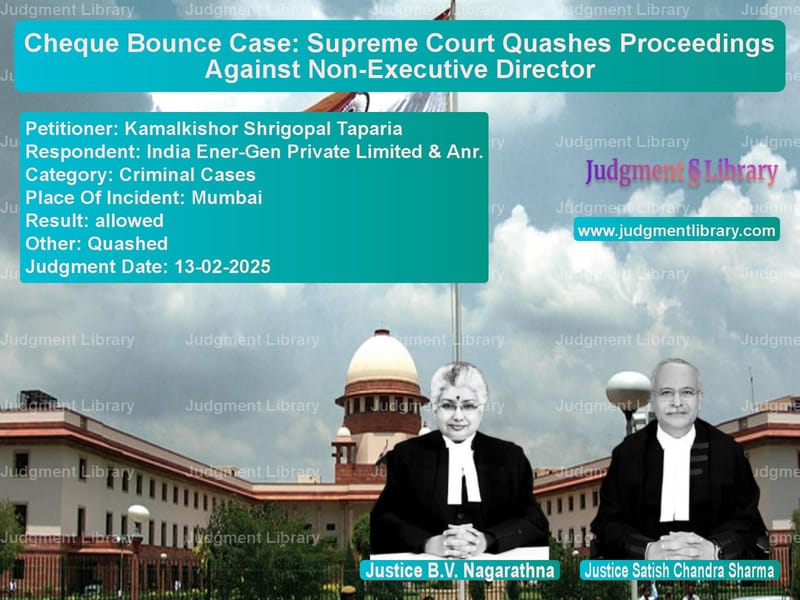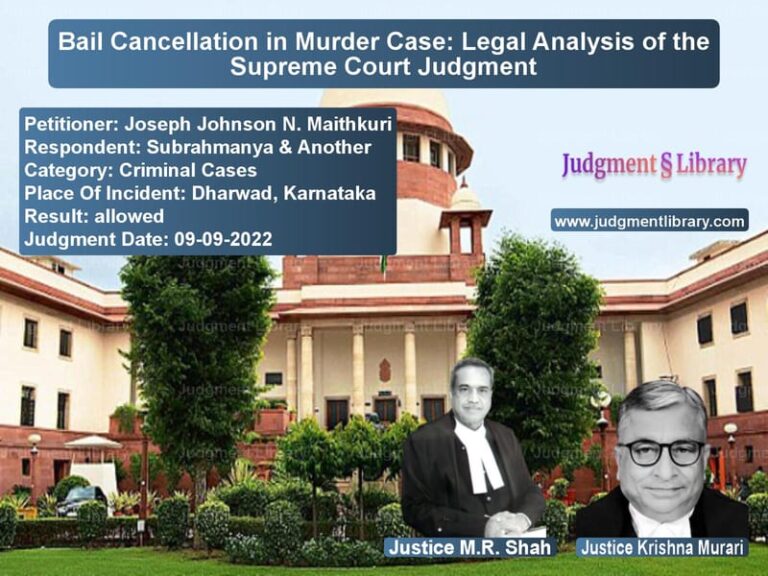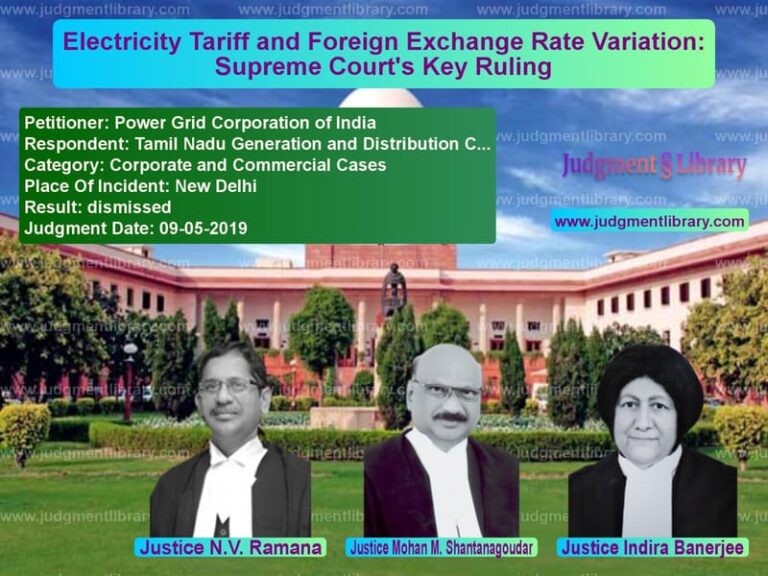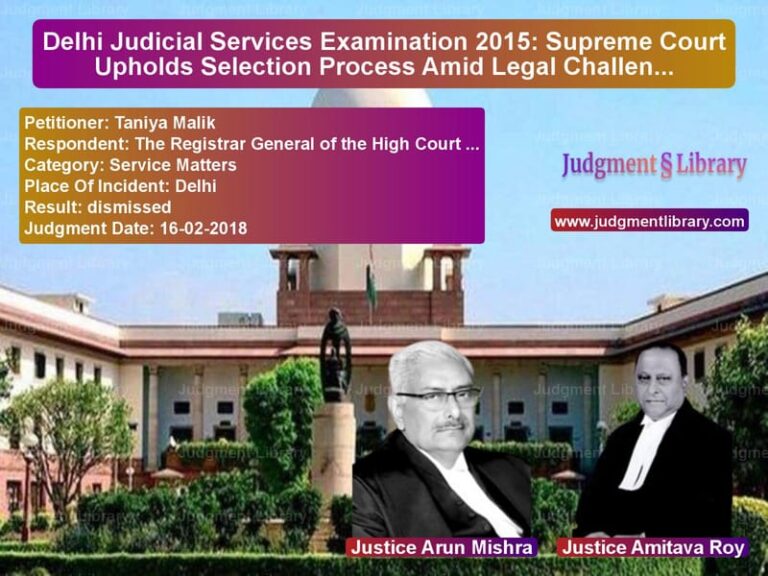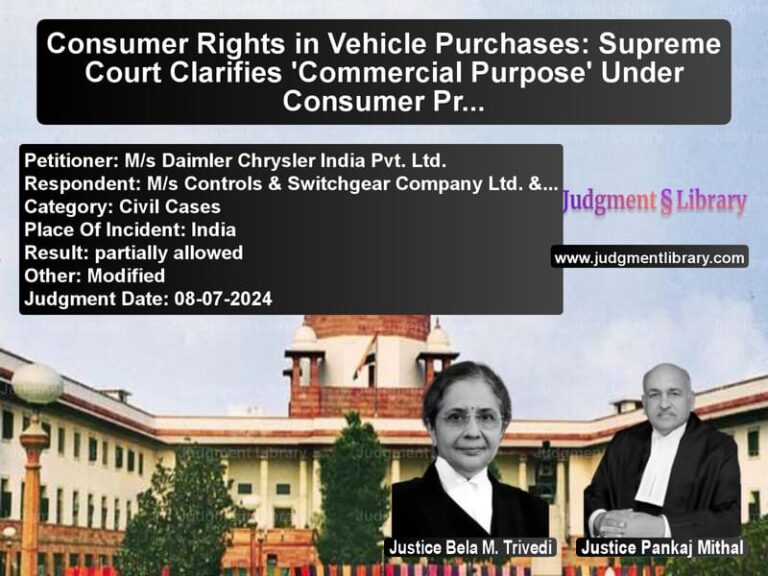Cheque Bounce Case: Supreme Court Quashes Proceedings Against Non-Executive Director
The Supreme Court of India recently ruled in the case of Kamalkishor Shrigopal Taparia vs. India Ener-Gen Private Limited & Anr., addressing the question of whether a non-executive director can be held vicariously liable under Section 138 read with Section 141 of the Negotiable Instruments Act, 1881 (NI Act) for dishonoured cheques issued by a company. This ruling provides clarity on the liability of directors in cheque bounce cases, particularly independent and non-executive directors who have no direct involvement in a company’s financial operations.
The appeal was filed by Kamalkishor Shrigopal Taparia against the Bombay High Court’s order dated 06.08.2019, which dismissed his plea for quashing criminal proceedings under Section 482 of the Code of Criminal Procedure (CrPC). The High Court had observed that the appellant’s role in the company was a matter to be examined at trial, rejecting his contention that he had no liability under the NI Act.
Background of the Case
The case arose from the dishonour of cheques issued by M/s D.S. Kulkarni Developers Ltd. (the “company”), which had availed loans from the respondent during 2016-2017. The company issued multiple post-dated cheques, which were dishonoured due to insufficient funds. Consequently, criminal complaints were filed against the company, and the appellant, a non-executive independent director, was also named as an accused.
Read also: https://judgmentlibrary.com/dowry-death-and-acquittal-supreme-court-reverses-husbands-conviction/
The dishonoured cheques included:
- Cheque No. 455494, dated 24.11.2016, for ₹8,00,000/-
- Cheque No. 455495, dated 25.12.2016, for ₹8,00,000/-
- Cheque No. 455496, dated 25.01.2017, for ₹8,00,000/-
- Cheques No. 455497, 455498, 455499, and 455500, dated 28.02.2017, for ₹10,00,000/- each
Notably, the appellant neither signed nor authorized the issuance of these cheques. Furthermore, he had resigned from his directorship on 03.05.2017, and his resignation was formally recorded with the Registrar of Companies through Forms DIR-11 and DIR-12.
Arguments of the Petitioner
The learned counsel for the appellant contended:
- The appellant was a non-executive director and had no involvement in the day-to-day financial affairs of the company.
- The complaints did not specify his role in the dishonour of the cheques.
- Under Section 141 of the NI Act, vicarious liability applies only to directors responsible for the conduct of a company’s business at the relevant time.
- The appellant had resigned from his position before the alleged offence, making his prosecution untenable.
- The proceedings against him amounted to a misuse of legal provisions.
Arguments of the Respondents
The respondents argued:
- The High Court was correct in refusing to quash the proceedings at a pre-trial stage.
- The appellant, by virtue of being a director, was part of the company’s decision-making apparatus.
- Under Section 141 of the NI Act, all directors, including non-executive ones, could be held liable unless they proved otherwise.
- It was a matter of trial to determine the extent of the appellant’s involvement.
Supreme Court’s Observations
The Supreme Court examined key legal precedents and noted that liability under Section 141 of the NI Act does not automatically extend to all directors. The Court cited:
- National Small Industries Corporation Ltd. vs. Harmeet Singh Paintal (2010) 3 SCC 330: Liability must be based on specific allegations demonstrating a director’s role.
- N.K. Wahi vs. Shekhar Singh (2007) 9 SCC 481: Mere directorship does not constitute liability unless specific evidence shows active involvement.
- S.M.S. Pharmaceuticals Ltd. vs. Neeta Bhalla (2005) 8 SCC 89: Only those responsible for the business operations of a company can be held accountable under Section 141.
- Pooja Ravinder Devidasani vs. State of Maharashtra (2014) 16 SCC 1: Non-executive directors, who play a governance role and do not partake in financial decision-making, cannot be held liable under Section 138.
Verbatim Court Observations
The Court made significant observations, stating:
“A mere designation as a director does not conclusively establish liability under Section 138 read with Section 141 of the NI Act. Liability is contingent upon specific allegations demonstrating the director’s active involvement in the company’s affairs at the relevant time.”
“Vicarious liability on the part of a person must be pleaded and proved and not inferred. If the accused is merely holding a directorial position without being in charge of and responsible for the company’s business, they cannot be made liable.”
“The appellant was neither a signatory to the dishonoured cheques nor was actively involved in financial decision-making. Furthermore, he resigned prior to the alleged offence, making his prosecution legally untenable.”
Final Judgment
The Supreme Court ruled in favor of the appellant and set aside the High Court’s judgment. It held that:
- The appellant had no role in the financial operations of the company.
- The complaints lacked specific allegations regarding his involvement.
- His resignation before the alleged offence absolved him of liability.
- Proceedings against him were legally unsustainable.
Accordingly, the criminal proceedings against the appellant in Complaint Nos. 66/SS, 645/SS, 697/SS, and 1595/SS of 2017 were quashed.
Conclusion
The Supreme Court’s judgment reinforces the principle that liability under Section 138 read with Section 141 of the NI Act is not automatic for directors. Independent and non-executive directors who do not participate in a company’s financial dealings cannot be prosecuted unless specific allegations establish their culpability. This ruling provides crucial legal clarity, ensuring that directors not involved in financial operations are not wrongfully implicated in cheque bounce cases.
Petitioner Name: Kamalkishor Shrigopal Taparia.Respondent Name: India Ener-Gen Private Limited & Anr..Judgment By: Justice B.V. Nagarathna, Justice Satish Chandra Sharma.Place Of Incident: Mumbai.Judgment Date: 13-02-2025.
Don’t miss out on the full details! Download the complete judgment in PDF format below and gain valuable insights instantly!
Download Judgment: kamalkishor-shrigopa-vs-india-ener-gen-priva-supreme-court-of-india-judgment-dated-13-02-2025.pdf
Directly Download Judgment: Directly download this Judgment
See all petitions in Fraud and Forgery
See all petitions in Money Laundering Cases
See all petitions in Judgment by B.V. Nagarathna
See all petitions in Judgment by Satish Chandra Sharma
See all petitions in allowed
See all petitions in Quashed
See all petitions in supreme court of India judgments February 2025
See all petitions in 2025 judgments
See all posts in Criminal Cases Category
See all allowed petitions in Criminal Cases Category
See all Dismissed petitions in Criminal Cases Category
See all partially allowed petitions in Criminal Cases Category

